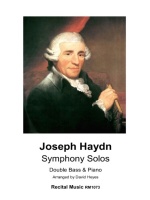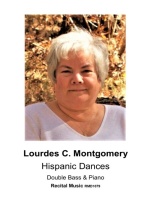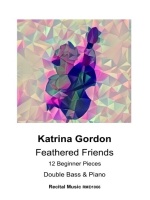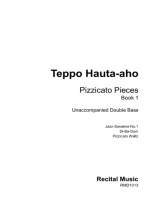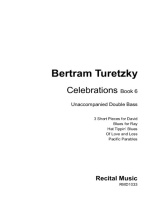Your basket is currently empty!
Celebrations Book 2
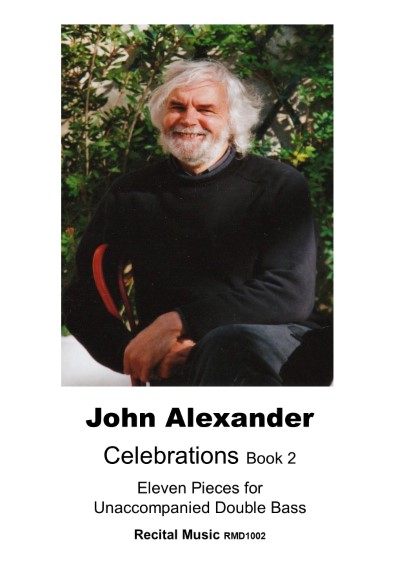
Description
Celebrations Book 2 brings together eleven exciting and evocative works for unaccompanied double bass by John Alexander, composed between 2018 and 2021. All were written for projects directed …by David Heyes and Recital Music, many for anniversaries or commemorations, and all are aimed at the intermediate bassist.
John Alexander exploits and explores a wealth of colours and timbres available to the contemporary double bass, within a lyrical framework, creating pieces which offer musical and technical challenges in equal measure.
Programme notes by the composer
four aspects of Prague (composed for Pošta100)
Prague is one of those great cosmopolitan European cities full of culture and architectural character. These little pieces for double bass, which contribute to the centenary commemoration of František Pošta (1919-1991), attempt to suggest musical ideas of the city where he spent much of his adult life.
1.a walk in havlíček gardens The layout and features of this park were very much inspired by the Italian Renaissance. A stroll through these gardens, even at dusk, offers a unique view of the city.
2. café louvre, “an island of noisy tranquillity”, was somewhere Albert Einstein frequented when he was working at the Prague German University.
3. the dancing house Although František Pošta would not have known this building – the site remained a vacant bombed scar for most of Pošta’s working life – he would have been aware of Václav Havel coming to power following the overthrow of communism in 1989 and his vision for the country. This included a new cultural centre famous for its pair of highly original towers resembling a dancing couple, designed by the Canadian architect, Frank O Gehry.
4. on golden lane Golden Lane is renowned for its picturesque, tiny and colourful houses cosily built into the eastern walls of Prague Castle. The writer, Franz Kafka, lived at no. 22 for a couple of years during the 1st World War.
PREMIERE: Sunday 12 May 2019 – The Spire, Farnham (Surrey) – David Heyes (double bass)
a mingled yarn (composed for Self-Portrait 2021)
I’ve often thought that what we write as composers is not necessarily just a collection of individual pieces of music. What we compose during the course of our lives may also be collectively viewed as one gigantic single work written by nobody else, simply because the creative choices – involving a miscellany of influences of course, not exactly like anybody else’s – have been made by a unique person: in this case, me. With this in mind, I recalled reading in the mid-sixties a book called ‘Advertisements for Myself’, by Norman Mailer, a sort of memoir that spoke about his works as well as himself. So I started this self-portrait project with the notes A, D and E flat (Ads for myself, as it were), and accordingly opted to also include elements of pieces I have written over the years to ostensibly test out my frequent thought (see above). Oh, and the title of this piece comes from the quotation, ‘The web of our life is of a mingled yarn, good and ill together’, borrowed from William Shakespeare’s ‘All’s Well That Ends Well’, Act IV, scene iii. What might this piece say about me? Well, amongst other things, I enjoy rhythmic interest, I like space, and I love a good tune. And I warmly dedicate this little self-portrait to my lovely wife, Patricia, with much love and thanks.
that sagacious del mar cat (composed for A Turetzky Tribute)
Over a number of years I’ve been fortunate to have had a most enjoyable and lively correspondence with the great Bertram Turetzky. His letters have been colourful – always handwritten, each with different hues of pen –, colloquial and wide ranging in terms of subject matter that might include history, politics, gardening, mystery novels, cats, family, Chomsky, films, health, musicians, plumbing, concerts, teaching, California fires, performing, humour, composing, sport, faculty meetings, swimming, the state of the world, poetry, “the noble but misunderstood contrabass”, travel, climate change; but mostly he discusses music.
My initial letter to Bert was about contemporary techniques on the bass. But I soon discovered that his enthusiastic interest in music went way beyond the modern stuff, his letters spanning Early Music to Morton Feldman or Duke Ellington, Mahler to Mingus or Monk. Within a short time of getting to know him, I wrote a flute/bass duo – ‘rain spirit passing’, Recital Music RM192 – for Bert and his wife Nancy, which they recorded (on Imaginary Chicago Records 009, 2011) and which they generously toured widely in the USA and Europe. In one of his letters to me, Bert writes: “The blues are very dear to me. They bring back memories of my teenage years when I was ‘jazz-mad’ and had the pleasure of ‘sitting in’ with some of the black stars”. Although my piece is not a blues, it might contain certain elements and maybe a feeling of that form. Most of all, what I hope ‘that sagacious del mar cat’ captures is (a) that quality of laid back freedom, as shown in his letters, and (b) a picture of an adventurous younger Bertram Turetzky voraciously probing the ‘new’ in music, with an acknowledgement that such exploration has continued and surely sustained him through a gloriously ‘giving’ life.
This piece for unaccompanied contrabass is affectionately dedicated to Bert in celebration of his 85th birthday and I wish him many more years of making music in one form or another.
roseaux dans anches (composed for The Syrinx Project)
For his play ‘Psyché’, playwright Gabriel Mourey asked Claude Debussy to compose incidental music depicting “the last melody that Pan plays before his death”; the composer delivered ‘La Flûte de Pan, or Syrinx’ for unaccompanied flute. In Debussy’s day, shepherds could still be heard playing panpipes to their flock in the Southern French countryside. In actual fact, the panpipe is an extremely ancient wind instrument and bears the name that evolved from the Greek legend of the god Pan pursuing the nymph Syrinx; of her being saved and changed in the nick of time by the Naiades into a bunch of reeds. Pan noticed how the wind made these musical; and he cut them down into different lengths, bound them together and began to play. In the French language, there are two words for our single English one for ‘reed’: ‘roseau’, for the botanical meaning, and ‘anche’, for the musical. And so I had my title, of some singular entity transforming into something else whilst maintaining a similar and recognisable structure. This work, ‘roseau dans anches’, composed for unaccompanied double bass, is a variation on Debussy’s model and is warmly dedicated to Dritan Gani.
PREMIERE: Saturday 4 August 2018 – Boccherini Institute, Lucca, Italy (Bass2018) – Dritan Gani (double bass)
3 for da Vinci 500br />When I composed these three short pieces – 1) man, 2) machine, and 3) nature – I had images in my head that were remembrances of drawings by Leonardo da Vinci, and which veered towards the scientific side of his vast and astonishing output. I feel that I do not need to be specific; so I am leaving the titles in a generic form to allow the listener of these pieces to utilise their own imagination and memory. Appreciating art frequently involves trying to understand meaning through representation. Whilst listening to organised sounds that are attempting to express pictorial art work, what we are perhaps trying to do is understand the chosen representation – reflected in a particular piece of music – via our individual imaginations and memories. These three compositions for unaccompanied double bass are warmly dedicated to David Heyes and Dritan Gani.
PREMIERE: Thursday 2 May 2019 at Silk Mill West, Frome, Somerset – Dritan Gani (double bass)
aubade, september ’60 (composed for 60@60)
…an original day, new birth, fresh beginning, a novel idea, taking shape, shaping tomorrow, way beyond just his own country, making music and music making, towards a double bass dawn. [This little piece became one of the themes of movement three of John Alexander’s ‘concerto in three movements’ for solo double bass and string orchestra.]
PREMIERE: Tuesday 8 October 2019, Quilter Hall, Wells (Somerset, UK) – David Heyes (double bass)
traverse the glistening sand (composed for the 90th birthday of François Rabbath)
In describing part of his left hand technique for playing the double bass, François Rabbath recalled in his youth watching a crab run and jump along the beach without stumbling. What he detected was how comparable the movement of this crustacean was to that of a human hand. The young François ran home and wrote more than 20 pages of technique that interpreted the sturdiness of the crab’s movements into a way of ‘walking’ with the left hand, a semitone at a time, along the fingerboard of the bass. This innovative method has served the discoverer (Rabbath) successfully and securely ever since throughout his performing career.
In composing this piece for unaccompanied double bass, I wanted to try to embody in music the fanciful idea of moving across time simultaneously in at least two ways: 1) a crab being observed travelling over a beach, grains of sand maybe reflecting the morning sun; and 2), the depiction of a man sustaining a memory and a self-taught technique over a multitude of performances, lighting up thousands of listeners’ lives like grains of tide-wet sand in moonlight. It is with cordial respect that I dedicate this little piece to the extraordinary François Rabbath in celebration of his 90th birthday.
no ordinary time (dedicated to the memory of Tony Osborne (1947-2019)
I first met Tony Osborne on Tuesday, 10th August 1999 at Bass-Fest in Reading. On that day, I was there to hear the world premiere of the earliest and the only piece I had (then) written for unaccompanied double bass, ‘abalone’, which had been awarded first prize in the British & International Bass Forum’s Composition Competition. Corrado Canonici, a member of that competition jury, would be giving the performance. Tony had also been one of the jury members. Whereas I had been somewhat diffident and inarticulate at our initial meeting, he couldn’t have been more genial, erudite or encouraging towards me. This was no ordinary time and it was clear to me – and became clearer over subsequent years – that Tony Osborne was no ordinary man. He had the common touch, with his music and with people. Our paths would often cross later, as significant birthdays for each of us would coincide in the same year and joint concerts would be generously arranged by David Heyes – another of the Forum’s competition jury members. Over time I was rewarded with hearing many of Tony’s works at those and other concerts. And we kept in touch, mostly through Facebook posts, and discovered that we shared many musical, political and, in particular, environmental convictions or views. This piece, ‘no ordinary time’, directly refers to my personal thoughts about and feelings for and memories of Tony Osborne. The opening five bars more or less duplicate the last bars of ‘abalone’, to reflect that time of our inaugural meeting all those years ago. This music does not attempt to model itself on anything that Tony composed; any similarities found are purely coincidental and are of my own making and responsibility! However, it is warmly and affectionately dedicated to his memory.
dark chocolate (composed to celebrate the 80th birthday of Gary Karr)
At the central heart of this piece for unaccompanied double bass is a slow, aurally comforting arcing tune, trying to imagine what the taste of smooth chocolate might ‘sound’ like. On either side of this section of music are faster segments that depict craving, anticipation, insatiability, memory and delightful gratification. A short concluding coda reveals a dichotomy: sadness that the chocolate is now finished, but also a sense that this indulgence is completely satisfied – for now.
It is fairly common knowledge that the world renowned double bassist, Gary Karr, is also an ardent chocoholic and it is a huge privilege to warmly and respectfully dedicate this piece to him in celebration of his 80th birthday.
the dove (composed for the 80th birthday of Humphrey Clucas)
Few symbols have a tradition as long and as rich as the dove, a medium- sized, elegant and quietly attractive bird, pale in plumage. A frequent favourite in art, it often represents some aspect of the divine, of peace, purity and the Holy Spirit. The low, cooing sound of a dove sometimes served as mournful imagery to evoke the suffering of the people, or even a vehicle for atonement. This unaccompanied piece is warmly dedicated to Humphrey Clucas on his 80th birthday, a composer who has written (amongst other classifications) a number of solo works for the double bass and a great deal of liturgical choral music; and who – until his retirement in 1999 – was a member of Westminster Abbey Choir. In the music of ‘the dove’, I hope a performer or listener may find a hint of the bird and an aspect of the spiritual symbol.
time and tide (composed for the 80th birthdays of Teppo Hauta-aho & Frank Proto)
The title, ‘time and tide’, relates to the ancient proverb of Time and tide wait for no man, and which has been traced back to 1225. Most of us probably consider that the word ‘tide’ in this saying refers to the ever-changing ebb and flow of the ocean – I know I do – and recognise it as another natural phenomenon (like ‘time’) which man cannot control. But apparently, within this proverb the word means a season or a period of time like Christmastide. Be that as it may, in writing this piece of music I certainly approached it as a reference to the sea’s daily motion rather than the activity of a particular season. I also felt that at least music can sometimes afford us a sense of control over time and I hope that such a perception might be reflected or perhaps even experienced in this music. It is with great respect that I dedicate this work to two legendary composers and performers in the double bass world. I memorably met Teppo Hauta-aho 21 years ago and I remain in touch with him today; in addition, from time to time we have managed to catch up with each other at festivals or concerts. I’m aware that it is my loss that I have neither met nor know Frank Proto; but I have the utmost regard for both his music and his playing. A pattern of letters from their joint names have here been transcribed into notes and intertwined, varied and secreted about the work for my own compositional satisfaction and – with a little bit of luck – their mystification. However, I most of all hope that they each enjoy this version of ‘time and tide’ accepting it as a suitable tribute on the occasions of their individual 80th birthdays!
R.R.P £10
Our Price £8.5
